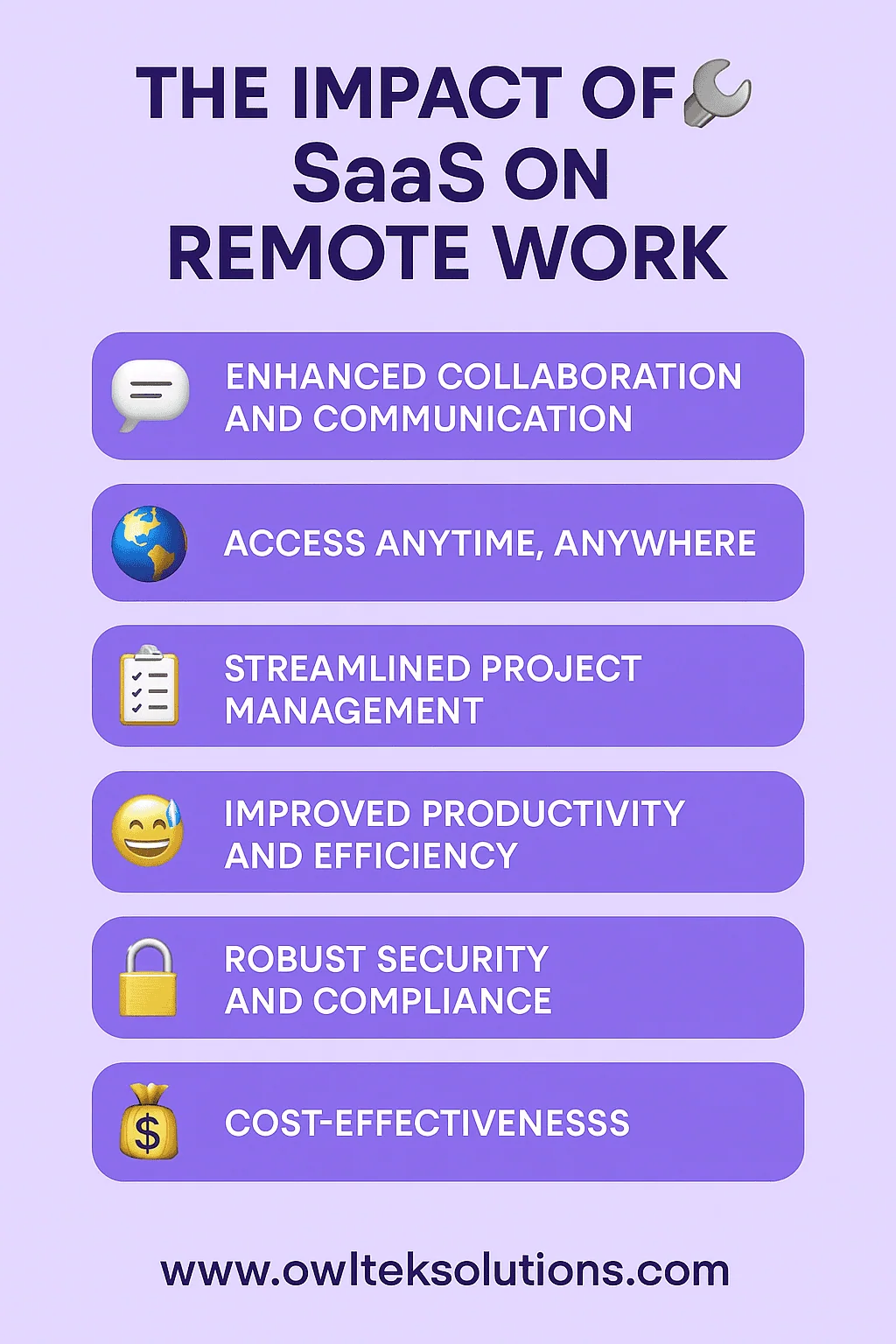Is your company struggling to stay connected in a remote work world?
How can businesses maintain productivity, security, and collaboration when employees are spread across different time zones?
The rise of Software as a Service (SaaS) has dramatically reshaped how remote teams function, communicate, and thrive. As organizations increasingly adopt hybrid or fully remote models, the demand for scalable, reliable, and user-friendly SaaS platforms has skyrocketed. From managing customer relationships to launching marketing campaigns, SaaS empowers businesses to work smarter and faster.
With lower upfront costs and real-time access to tools, even small startups can compete with larger enterprises. Additionally, SaaS makes it easier to integrate tools across departments, creating a seamless experience for teams working from anywhere. These tools aren’t just convenient—they’re essential for maintaining a competitive edge in today’s digital world.
Furthermore, SaaS solutions continuously evolve based on user feedback and industry trends. They bring agility to business processes, enabling faster decision-making and adaptation to market changes. As remote work becomes more than a trend and moves into long-term strategic planning, businesses must choose the right tools that foster collaboration, innovation, and productivity.
The convenience of accessing platforms like SE Ranking for SEO or Elementor for design from anywhere at any time has redefined what “being at work” really means. This shift has not only improved business performance but also elevated employee satisfaction and work-life balance. In short, SaaS is no longer optional—it’s indispensable.
In this blog post, we’ll explore the evolving SaaS experience—from essential collaboration tools to strategic integrations—and show how SaaS supports businesses in navigating remote work challenges. We’ll also highlight how platforms like SE Ranking and Elementor play pivotal roles in modern SaaS-based workflows.
What You’ll Learn
- The core benefits of SaaS tools for remote work
- How SE Ranking and Elementor enhance the SaaS experience
- Why cloud access is the foundation of modern work
- How CRM SaaS platforms support distributed teams
- Real-world SaaS use cases across project management and security
- The financial and strategic advantages of SaaS for remote teams
- Beginner-friendly breakdown of key SaaS business models
Enhanced Collaboration and Communication with SE Ranking and Elementor
Why Collaboration Tools Matter More Than Ever
SaaS tools have transformed remote collaboration. Platforms such as Slack, Zoom, and Microsoft Teams allow teams to communicate and share files in real time, recreating the dynamic of in-office teamwork. These tools help foster trust, clarity, and alignment among distributed team members. Communication silos are reduced, and project updates are more transparent. This leads to quicker decision-making, fewer errors, and greater engagement among team members. In a remote-first environment, communication tools are the glue that binds cross-functional teams. Asynchronous communication features, such as thread-based discussions and integrations with calendars, further help global teams coordinate with ease.
SE Ranking for SEO Teams
SE Ranking is not just for SEO tracking—it’s also a remote-friendly collaborative tool. Teams can assign tasks, annotate data, and manage campaigns together. Its dashboard provides real-time updates, making remote marketing workflows more transparent. This eliminates the need for scattered spreadsheets and status update meetings, creating more time for strategic planning. For SEO freelancers and agencies, SE Ranking serves as a centralized collaboration hub. Similarly, influencer marketing plays a critical role in e-commerce, helping brands connect with digital audiences through authentic, trust-based strategies that complement SaaS-driven marketing efforts.
Elementor for Design Collaboration
Elementor streamlines remote website design. Designers, developers, and marketers can collaborate visually within the WordPress ecosystem. Real-time editing and shared templates make remote design more fluid and accessible. Teams can simultaneously review content and layout, providing feedback within the platform itself. This collaborative approach accelerates timelines and enhances design outcomes. Elementor also supports dynamic content creation through integrations with tools like ACF and WooCommerce, further expanding team capabilities.
Image Suggestion: Screenshot of a collaborative SE Ranking or Elementor workspace showing team roles and real-time edits.
Cloud-Based Flexibility: Work Anywhere, Anytime
The Power of Access on Demand
SaaS platforms are inherently cloud-based, which means employees can log in from any device with internet access. This flexibility is essential for today’s mobile workforce. Whether you’re logging in from a café, a client’s office, or a coworking space, your productivity doesn’t have to suffer. Cloud access helps reduce hardware limitations and IT dependency. It also supports a more inclusive workplace by accommodating different work styles and personal circumstances. Cloud-based SaaS also ensures updates and upgrades happen automatically, eliminating the need for manual patches and saving IT resources.
Software on Demand, Not on Premises
With software on demand, businesses don’t need to install bulky software on every device. Tools like Google Workspace and Dropbox exemplify this advantage, keeping employees connected regardless of geography. Updates are automatic and often require zero downtime. This approach minimizes security risks and keeps systems running on the latest version. It also makes onboarding new team members much faster. Moreover, the scalability of software on demand ensures that companies only pay for what they use, optimizing cost-efficiency.
Elementor and SE Ranking on the Go
Both SE Ranking and Elementor offer browser-based interfaces. Whether you’re running keyword audits or building landing pages, you can do it from a café, home office, or while traveling. These platforms are optimized for mobile use, ensuring accessibility doesn’t compromise functionality. This is especially valuable for freelancers or teams working across time zones. Having a responsive and mobile-optimized interface means decision-making and quick edits are possible on the fly.
Image Suggestion: Mobile or tablet screenshots of SE Ranking and Elementor in use.
Streamlined Project Management via SaaS
Remote Teams Need Clarity and Visibility
Project management becomes easier when everyone sees the same dashboard. SaaS tools like Asana, ClickUp, and Monday.com provide a unified workspace. This visibility ensures tasks aren’t duplicated, missed, or delayed. It encourages accountability while keeping all stakeholders in the loop. For remote teams, transparency builds trust and drives consistent execution. Many of these tools also offer time tracking and performance analytics, which are critical for remote workforce management.
Integrating CRM SaaS Tools
Customer-focused businesses often use CRM SaaS platforms like HubSpot and Salesforce. These tools offer deep integrations that keep marketing, sales, and support aligned, even when working remotely. CRM SaaS ensures customer data is accurate and accessible, facilitating better service and follow-up. Automations within CRMs streamline lead nurturing and improve response times. For growing businesses, a CRM SaaS is a foundational asset. Integrating a CRM with communication tools allows teams to respond quickly to customer inquiries, enhancing client satisfaction.
Connecting with Elementor and SE Ranking
Using Elementor for building CRM-integrated landing pages or SE Ranking for reporting makes managing projects easier. You can automate updates, pull reports, and align teams around shared objectives. Integration reduces tool fatigue and consolidates work into a single dashboard. This results in smoother handoffs between departments and fewer manual errors. These integrations enable real-time monitoring of KPIs, making it easier to pivot or adjust campaigns without delays.
Image Suggestion: Workflow diagram showing CRM SaaS integration with project management tools.
Improved Productivity Through Automation
Automate Repetitive Tasks
One of the greatest advantages of SaaS tools is their ability to automate routine and repetitive tasks. Whether it’s scheduling social media posts, sending welcome emails, or generating reports, automation frees up valuable time for strategic work. This is essential in remote settings where teams are distributed and real-time coordination may be limited.
CRM SaaS Meets Automation
Platforms like SE Ranking integrate well with automation tools such as Zapier or Make, enabling marketers to automatically track keyword rankings, generate SEO reports, and sync updates across platforms. CRM SaaS tools also automate follow-ups, data syncing, and reminders, reducing manual errors and ensuring consistency. These systems don’t just streamline internal workflows—they also influence customer interactions. In fact, understanding the impact of reviews on sales is becoming increasingly important, as CRM tools help collect, manage, and respond to customer feedback that directly affects purchase decisions.
Elementor’s Time-Saving Templates
Elementor allows users to create and reuse design blocks or full-page templates. This means that once a remote design team sets up a landing page layout, they can duplicate it with a few clicks and tailor it for different campaigns—no need to start from scratch each time.
Ensuring Security and Compliance Remotely
The Importance of Remote Security
Security is a growing concern as more people work from home networks, which may lack the protections of corporate IT systems. SaaS platforms have risen to this challenge by offering robust enterprise-level security features.
SE Ranking’s Secure Environment
SE Ranking uses encrypted data storage, secure login options, and granular permissions to ensure that sensitive campaign and user data remain protected. Regular audits and compliance checks enhance its reliability for agencies handling confidential SEO data.
Elementor’s Compatibility with Security Tools
Because Elementor operates within the WordPress ecosystem, it supports many popular security plugins and tools, allowing you to implement firewalls, malware scanning, and scheduled backups. With Elementor, teams can build websites that are not only beautiful and functional but also secure.
Financial Flexibility of the SaaS Business Model
Lower Upfront Costs
The SaaS business model helps businesses avoid heavy initial investments. Instead of paying thousands upfront, companies subscribe to tools on a monthly or annual basis, making budgeting more predictable and manageable.
SE Ranking and Elementor Plans
Both SE Ranking and Elementor offer flexible pricing. You can start with basic plans and scale as your team grows. For agencies, these tools are cost-effective options that offer premium features at a fraction of traditional software costs.
Pay for What You Need
SaaS platforms are highly scalable. Whether you’re adding new users or increasing storage, adjustments can be made instantly. This adaptability ensures businesses aren’t overpaying for features they don’t need, optimizing every dollar spent.
SaaS Experience and the Future of Remote Work

The Evolution Continues
The SaaS experience is continually evolving. Expect more AI integration, voice command capabilities, predictive analytics, and seamless integrations with other platforms. SaaS tools are becoming smarter and more intuitive.
SE Ranking and Elementor Lead the Way
SE Ranking is already integrating AI-driven insights into its dashboards, giving marketers a head start on trend identification and strategy. Elementor is continuously releasing updates focused on accessibility, performance, and user collaboration.
A Smarter Remote World
In the future, remote work will rely even more heavily on SaaS. As hybrid models take over and global hiring expands, SaaS tools will serve as the central nervous system of business operations.
Final Thoughts
The SaaS model has fundamentally reshaped the remote work environment. Through platforms like SE Ranking and Elementor, businesses gain a competitive edge in collaboration, productivity, and scalability. Whether you’re managing a marketing team, developing websites, or streamlining workflows, embracing the right SaaS experience is essential for success in today’s digital-first economy.
Software on demand is not just a trend—it’s the infrastructure of the future.Discover the latest insights and innovations in SAAS from Owltek Solutions – join the conversation and stay ahead in the tech world!

